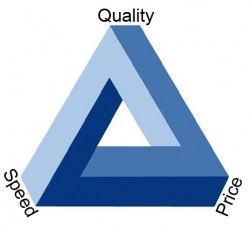 The trade-offs that small businesses are making are wrong. Well, most of them are. Look at the picture on the left and it will get obvious that you can’t just tweak one of the parameters without compromising other two.
The trade-offs that small businesses are making are wrong. Well, most of them are. Look at the picture on the left and it will get obvious that you can’t just tweak one of the parameters without compromising other two.
Here’s where it gets tricky. Sometimes, during negotiations, when clients ask me how much would something cost I say I can do cheap, good, fast – pick any two. What should come to no surprise to anyone is that clients almost always pick “cheap” first. Then they add “good”. Then, after some thinking, they say “and I don’t want it to drag into next year”. It’ not just that this is “crisis” and people are short on cash. It’s the way of thinking of small business owner. Guess what’s wrong with this picture?
You think nothing? Alright, read on.
First of all – once any business you’re dealing with (and we are talking about B2B here) hears you pick “cheap” first – they think you are cheap and rightly so. What you probably missing is the departure of their train of though. If you are cheap – they better off try their chances somewhere else where they can make more money. Oops. You just lost a valuable partner, future investor or a bunch of referrals.
Second – when they hear you pick “good” as a second, they immediately project this on your product or service. If “good” comes second for you when you are getting something for your business, it means you are not making goods or services good in the first place, you are making them cheap. And if they turn out to be good – it’s an added benefit. Oops again – you just did more damage to your image or brand than all your competition together.
Third – when they hear your projected time line is “sometime before next year” – they get a really good understanding of your take on schedules and deadlines. That is – if they are still listening at this point.
You can see that a natural response from most small business owners is damaging their reputation – in both short and long term. Even though there is no right answer to this question (strictly speaking), any business owner who want their business to grow should know how to answer that. How? Next post would elaborate on that.